Spectre : When Bond's World Collapses (2800 words)
Spectre opens with a four or five minutes tracking shot. The scene takes place in Mexico city on the day of the dead.
Bond, who is wearing a skeleton mask, flirts with a lady, follows her to her hotel room, leaves her hanging and reaches a strategic spot on a rooftop from where he intends to shoot a man.
If I understand well, he seduced this lady because he knew she was in this room !?! Damn he is good. How on earth did he find her in the crowd on the day of the dead !?! I wonder if he would have found another plan if she had been fat and ugly.
Anyway, the tracking shot ends when Bond has his target in focus. The obvious purpose of this shot is to show how much Bond never loses sight of his objective; he is not going to be lead astray by anything. The fact that he should decline a sexual offer from a beautiful and sensual woman goes in the same direction as the fluidity of the scene, the absence of any stutter. Everything goes smoothly, suavely and unstoppably, straight where James Bond want things to go.
I understand that this explanation should feel exactly like “gratuitous tracking shot,” and I’m writing this article to specifically contradict this opinion which was voiced by a guy at screen junkies. If this scene didn’t take place on the day of the dead, and it wasn’t the 24th James Bond movie, the relevance of the tracking shot wouldn’t be questioned. We would all consider it a fine way to establish our new hero. Just imagine a guy flirting with a woman, entering a hotel room, getting rid of her and then climbing on rooftops to shoot a target, all this done in a single shot, but on a normal day. It would just look great and skillful.
Now, it’s the day of the dead that feels forced and gratuitous. But doesn’t it sound, on the contrary, like a perfect setting for something meaningful ? How hard can it be to find a meaning to this ?
The day of the dead. Who died ? Seriously, to whom could this day of the dead be associated in relation to Bond ? You’ve got your answer.
At the end of Skyfall, I was surprised at the simplicity with which her death was staged. James Bond holds her in his arms, she pays him a last compliment and dies. No explosion, no shout, no anger, no revenge, no anything. I was very disappointed that this mother figure would disappear without any large-scale consequence which would have allowed us to measure James Bond’s disarray. Yes, the simplicity was very appropriate but also frustrating in its hermeticism.
Of course it would be clumsy to justify the whole introduction to a film exclusively with something that happens in a previous one (even if it has already been done in the same franchise when Bond kills Blofeld at the beginning of For Your Eyes Only). But we learn later on, that this first killing was ordered by M after her death through a note (or a video, I can’t even remember).
So, when he walks around in Mexico City wearing a skeleton mask on the day of the dead, Bond is actually following M orders for the last time and mourning for her at the same time. Every move he makes is loaded with a special meaning, it is a ritual in her honor that he is performing. The unstoppable will that he displays while accomplishing his mission is a token of respect and love for M.
And complexity doesn’t end there. In Casino Royale, Bond was defined as a man who is constantly threatened by death because he is deprived of love. Just like Batman, they’re both always looking for someone to truly love them and finally put an end to their craziness. But unlike Batman who has always had Alfred, Bond experienced absolute loneliness and is ridden with suicidal drives that are ready to come into action as soon as all hope for love is gone.
At the beginning of Spectre, everybody is dead to him. I’ve just written this coincidentally, but it’s another reason for the presence of the Mexican celebration: Bond’s life is empty.
He himself is living on borrowed time. M dead, there is no love to maintain him alive. His sole reason to remain so is M’s mission, but as soon as it is over, there is no reason left to keep on living. So maybe he should make his mission lasts as long as possible ? But he can’t as M’s love is strongly linked with his efficiency as an agent. Her last words were “I did do something good.”
Seen from this point of view, M is a very negative character. I had already thought of that several times but as I’m not that interested in James Bond, I never tried to fully explore the question. The idea here is that M would be similar to a perverted mother who has such a precise idea of what her child should become that each times he steps away from this idea, she deprives him of her love “for his own good.” Bond, as an orphan, would respond to this manipulation very well. He nearly escapes her reach in Casino Royale thanks to a woman, be she dies and Bond is back under M’s influence.
I’ll leave you the pleasure to check whether Vesper Lynd’s death can be put on M. I wouldn’t say the Mother put a hit on Vesper but she could have interfered or chosen not to interfere in the whole story that lead to Vesper betraying Bond and dying. I remember there’s a serious discussion between Bond and M about Vesper after the woman died. Anyway.
I expected something huge in Skyfall because to me, the title of the film meant “Bond’s world collapses” when M dies. And actually, even if I haven’t explored this either, I’m sure Silva could be the “unruly” child that Bond wants to be: the deeper self that M crushes. And who else could kill M than Bond himself ?
But it’s at the beginning of Spectre that Bond’s world actually collapses from the repercussions of M’s death.
We can now perceive the tracking shot in somewhat different ways. Bond is either inflexible in his desire to accomplish his mission as a last token of love for M, or he is in automatic pilot because now that she is dead he cannot even have any room left to be “unruly,” to disobey. There is nobody to disobey to anymore, he cannot hope for any improvement in their relationship. I remember reading somewhere that controlling parents had an even greater impact on their children once they were dead because they became like gods. I can see some coherence in this.
Anyway, Bond and his skeleton mask is both a Terminator going for his target and a man marked by death who needs to find a solution quickly because death is imminent.
I’d like to point out that this interpretation brings depth to an already great sequence. There is something at stake on a very deep level here, it’s not just about a very bad guy needing to be killed. When we watch the opening sequence of Spectre, we are looking at what could be the mission that James Bond fails to accomplish and during which he dies.
I’m pointing that out because people regularly dismiss my reading of films as a good way to ruin the “real” experience and here I’m happy to have a simple example to give where everything becomes a lot heavier emotionally thanks to the subtext. And it is the case most of the time.
James Bond could die here because he is well aware of the fact that as soon as the target is dead, he has no reason to feel M’s love anymore. So he can die a violent death as a way to avoid a sad one. He can get himself shot and killed instead of experiencing a lethal loneliness.
The target in focus, Bond prefers to aim at the henchmen (because he is detected) and take the risk of letting the man escape. Shots are exchanged and suddenly the whole room explodes for no noticeable reason. Bam !
And then the whole building collapses over James. And the building he is standing on collapses too. These are the kind of elements that I expected to see express his distress in front of M’s death. James failed at killing his target, M is unhappy, James’ world collapses because it will never have a chance to make up for hi mistake. The low-angle shot on James looking at the building which is going to fall over him is the boy in him confronted to the wrath of his godlike mother.
It might seem far-fetched but that’s actually what is truly great about movies, they allow us to represent psychological events according to signifiers of our earthly life. Our need for love and recognition are stronger than any political plot and it is only logical that father figures and mother figures should populate an orphan spy’s missions. And it is not a coincidence either that he should stop the bullshit when he finds a woman to love him, same thing for Batman. Who’s an orphan too now that I think. And both have a tendency to enjoy the use of toys. Dammit, are these two the same character or what ?
Bond absurdly survives the caving in of the building. This necessarily has a meaning but I must admit I can’t quite point my finger on it. I’m referring to his fall on the sofa. This means “he should have died but doesn’t because he was lucky.” Luck is not meaningless. Luck means “next time he won’t be so lucky.” It sometimes give the feeling that a character is invincible, but in general it is used to convey the opposite impression, the impression that the character will not last long anymore if he carries on in this direction.
Nathan Drake in Uncharted 3 is a good example of that. Damn, another orphan chasing love in a very popular franchise ! How come ? Could this mean something ? Like maybe, our culture is based on the withdrawal of love from men so that they become perfect insensitive obedient tools, and this to such an extreme degree that they end up identifying with orphans… naaa, that’s far-fetched, our culture is beautiful and male-dominated, being a heterosexual man is living the dream really.
I don’t know if James’ stroke of luck is to be associated with the fact that the collapse of the building is a metaphor of M’s dissatisfaction. By that I mean that as impressive as it can be, it cannot harm Bond because it’s only a mother scolding a child. Its funny outcome might point at this interpretation, Bond falls on a sofa: the reception of his fall had been prepared. And there’s something that reminds cartoon or slapstick in all this which doesn’t quite correspond to the “next time he’s dead” interpretation.
Anyway, back in the streets of Mexico, everything is grey and apocalyptic. This perfectly corresponds to the “end of times” atmosphere that M should trigger in Bond’s mind.
But we need to wonder, “who is Bond’s target if M is his mother” ? If all of this is a metaphor, the main target of the mission necessarily bears a meaning.
Let’s just imagine, it’s M’s funeral and her son feels that he should hold a grudge against somebody in order to remain eligible to her love. Who is it ? The father who didn’t love her properly and thus made her develop an unhealthy relationship with her son ? Mmm… that’s all I can come up with, but it actually make sense.
A father neglects a mother who in response looks for love in her son, who cannot properly grow up and remains stuck in pre-oedipal stage. If my blind take on Skyfall is coherent, M dies because James rebels against her and the beginning of Spectre would be M admitting that the starting point of all this was the father’s desertion.
James thus is here to kill his father; to avenge his abandoned mother, and to take his place as in oedipal complex. I’d like to underline that both motivations are quite morbid.
It explains one thing though. During the chase, there is only one element that manages to slow Bond down a bit and I was quite intrigued by that: female dancers. Bond and his target exchange glances. That’s the only argument of Bond’s father: “there are other women in the world than your mother, you know.” And that’s a good point, but it’s too late for him.
They climb in the helicopter and give each other a very serious fight. Serious to the point that it should be considered that Bond could have lost that fight too.
But he manages to take the bad guy’s ring off his finger and you know, that’s the worst thing you can do to a bad guy. How can he defends himself if you take his ring off ? You can turn the epic music on the fight is over. I’m joking but that’s what happens in the film and it made me laugh a bit. After an incredibly impressive fight, Bond finally takes the upper hand by removing a ring off his enemy’s hand, instead of doing something more practical like picking up a gun, and kills him in one second.
Now, the ring. When I started to write this article I didn’t think of the bad guy as the father and I thought the ring meant that Bond finds a way-out through this clue to something bigger. If M wanted him to kill this guy, she surely would have wanted him to put an end to his organization. Hopefully, putting an end to a gigantic criminal organization would take Bond a lifetime. And actually, the film ends on him not killing Blofeld which I thought was quite ballsy of the screenwriters. Spectre is truly the end of James Bond and not until the next one. There will obviously be a next James Bond, but finding love and flipping a bird at his spy life will always be his end, whether it’s be in Spectre, On Her Majesty Secret Service, License to Kill (indirectly), Casino Royale or any future installment.
So, the ring is the clue to an endless mission which would always have M’s approval, but it is also… hum… marrying his mother.
Now that I think, isn’t Madeleine Swann a psychologist or something ? I’m sure there are a lot more clues of James Bond’s psychological struggle in the film.
Anyway, I made my point about the opening tracking shot and I integrated it into a wider interpretation. So I believe it looks a lot more coherent as part of a whole and a lot less gratuitous.
Last but not least, this:
Once he's found a way to avoid dying with her, James can cry over M's death. And the helicopter that falls down creates a situation in which Bond could simply let himself die. The need to strainghten up the trajectory makes his will to live explicit. After this, there is long shot of the helicopter flying over the city, too long to simply be a "James Bond wins again" statement, it's "he's back to life after a flirt with death."
Now, I’ve just watched a video of the Nostalgia critic about The Killing Joke, which I tackled a bit in my previous article. I liked it, he didn’t. At some point he draws a comparison with the comics and says that the writing is very different and dares risk the word “poetic” before withdrawing into “I know it sounds pretentious, I don’t like to talk like that.” (Exact quote “There’s just this kind of poetry in the writing, and I hate talking like that… I know it’s pretentious.”)
That’s where we are, people are scared shitless of sounding pretentious as soon as they dare utter an honest idea that suggests their depth, a sensitivity to quality. But destroying what is deep and meaningful is ok, because it puts everybody on the same foot of mediocrity. That’s why it’s better to criticize an impressive tracking-shot for being gratuitous than to flatly acknowledge the quality of something that is simply good and doesn’t need our approval to be.
Anyway, I hope it made you happy to read this, I know I’m really happy that this opening sequence exists. I couldn’t have hoped for a greater depiction of the impact of M’s death on Bond.

/image%2F1619753%2F20181114%2Fob_96b921_image002.jpg)

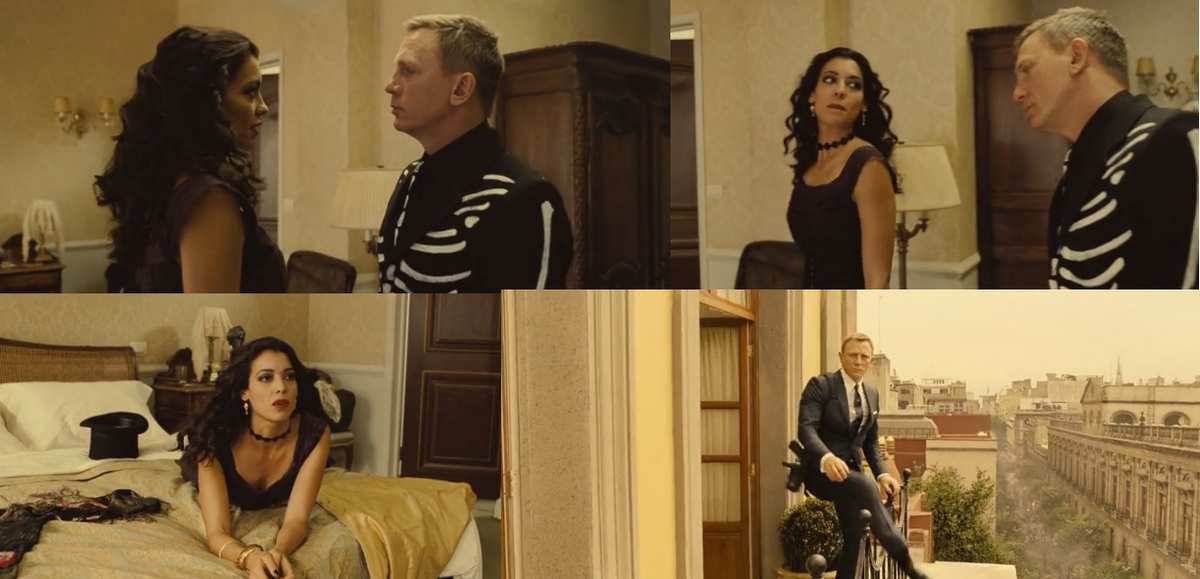

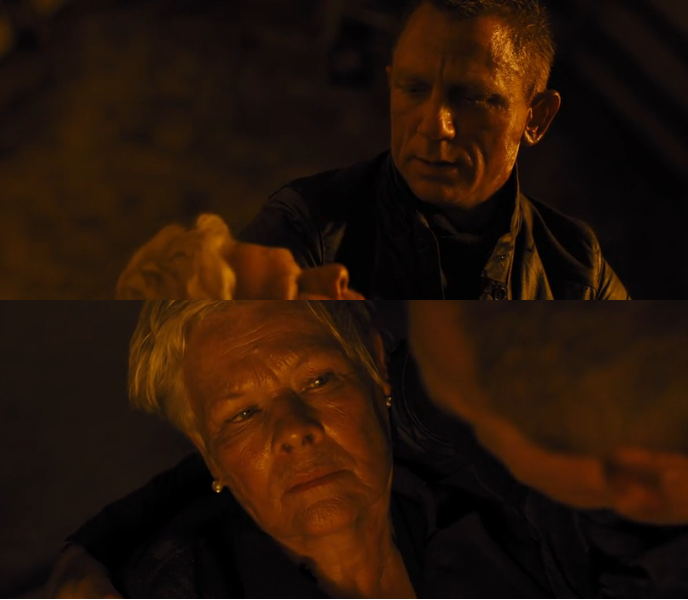
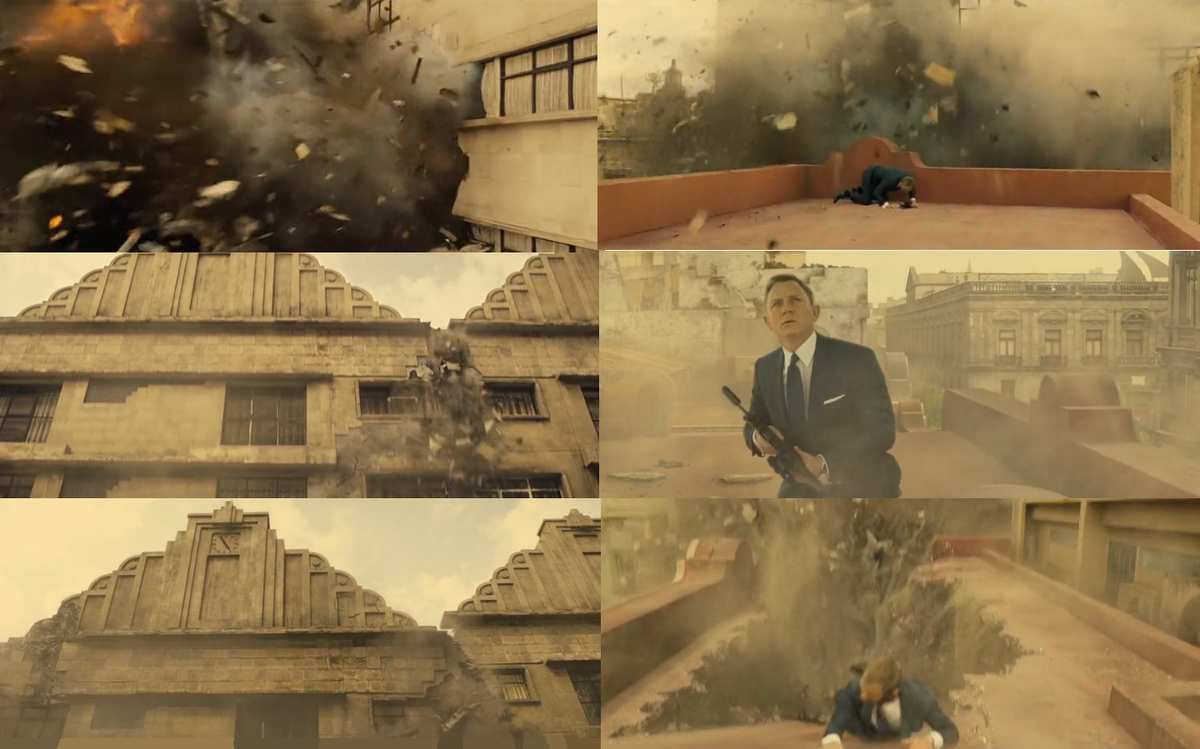
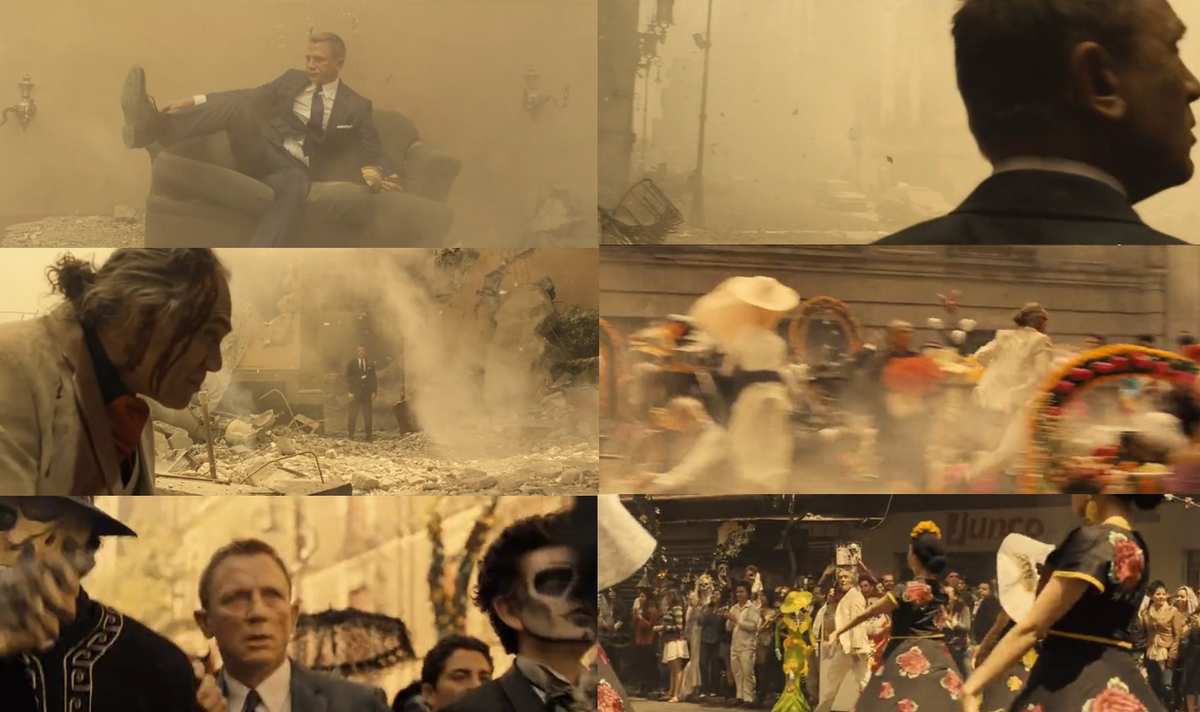


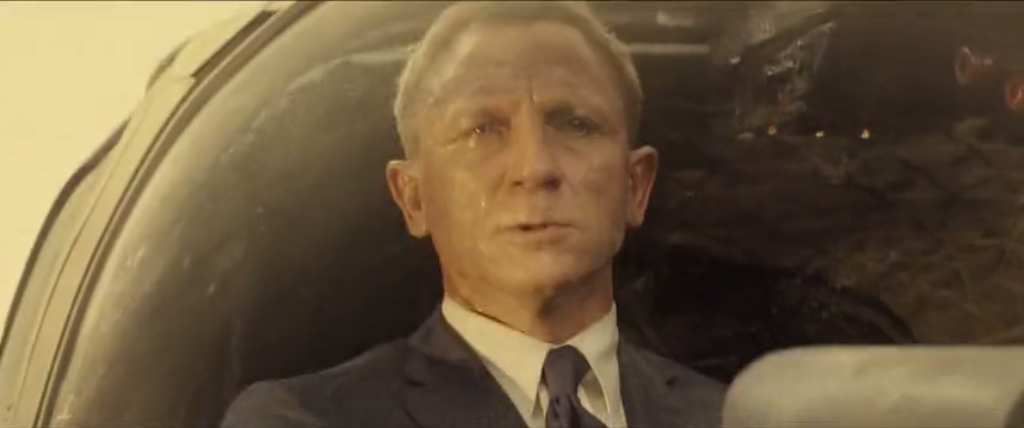


/image%2F1619753%2F20240329%2Fob_945ec9_325.png)
/image%2F1619753%2F20240229%2Fob_ed8d90_28.png)
/image%2F1619753%2F20240207%2Fob_21d540_30.png)
/image%2F1619753%2F20240126%2Fob_8d932a_01.png)
/image%2F1619753%2F20170202%2Fob_40c807_2017.jpg)